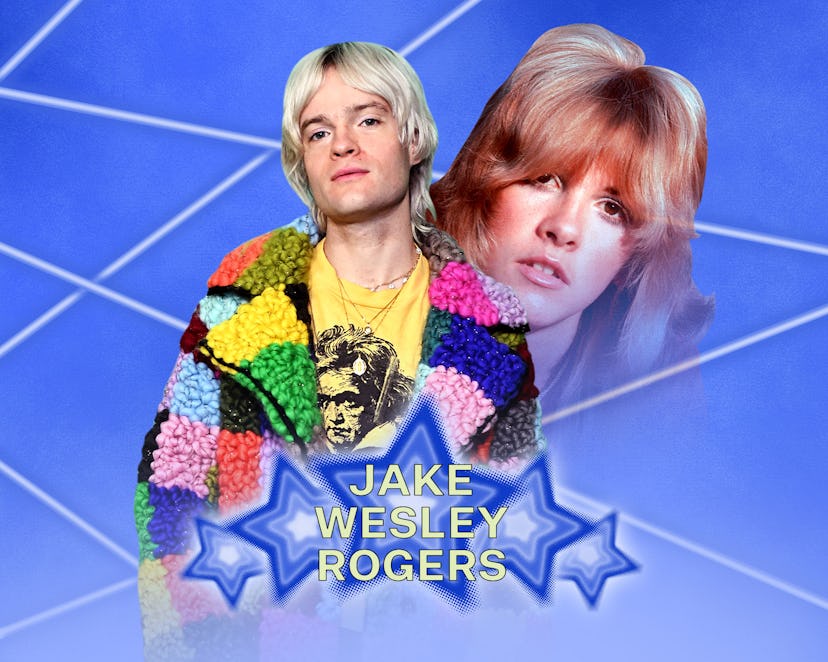Gold Dust Woman
Stevie Nicks Gave Jake Wesley Rogers The Words He Didn’t Know He Needed
The pop musician says Nicks, Joni Mitchell, and Maya Angelou emboldened him to tell the truth in his songs, even when it’s painful.

Jake Wesley Rogers’s gospel- and glam-rock-infused pop anthems have earned him raves from Elton John and opening gigs for Kesha and Cyndi Lauper. But though he’s been writing music since elementary school, the journey to make his first album was a winding one. “It took me a long time to discover what I wanted to say, which coincided with lots of therapy and journaling,” he says.
In times of struggle and writers’ block, Rogers, 28, turns to three women for inspiration: Stevie Nicks, Joni Mitchell, and Maya Angelou. Their influence is all over In the Key of Love (out now), which tackles Rogers’ religious upbringing, relationship woes, and LGBTQ+ politics with the same honesty and poetic vulnerability of his heroes. Below, Rogers shares how these icons shaped him over three transformative times in his life — and what they still teach him today.
Stevie Nicks was always a part of my life, because my mom loved her a lot. I remember hearing Fleetwood Mac as early as 4 or 5 years old, but middle school was the first time I really heard “Landslide,” and it changed my life. I was a young queer boy in Missouri, and I had so many feelings, but most of them couldn’t be voiced out loud. The song has this level of heartbreak and longing that I felt inside, but it was also one of the first times I heard somebody else go there in music.
I’d listen to “Landslide” over and over again, and I taught myself how to play it on guitar. When I sang it, it felt like I was finally saying what I needed to say out loud. The line “I’ve been afraid of changing because I’ve built my life around you” can speak to anybody who’s needing to live a more authentic life but is afraid of the repercussions. That’s pretty universal for the queer experience.
As I grew up, my love for her evolved. The first time I heard “Wild Heart” was also life-changing — her energy was so free, and it made me feel like I could also be that free. Seeing her live is transcendent. Even her subtle movements hold so much power. When she does a little twirl with her shawl, it’s the craziest thing you’ve ever seen. She’s taught me a lot as a performer — how to command a stage and to command energy.
“They were women who told their stories against all odds, at any cost. Nobody wanted them to be that honest. In fact, the world was probably insistent that they shouldn’t be.”
I moved to Nashville for college and started dating my then-boyfriend soon after. One night, he was driving me around and said, “Have you ever heard of Joni Mitchell?” He put on Court and Spark, and I was like, “What? This is different.” That first summer after freshman year, my soundtrack was Blue, which is maybe the greatest album of all time. The album deals with the experience of giving her child up for adoption. I’m a person without a uterus who has never given birth, let alone given up a baby for adoption, let alone gotten somebody pregnant — but for some reason, when she sings, it’s like I’ve experienced what she has. What she’s really getting at, though, is that we’ve all experienced suffering.
Not long after, when I graduated college, I read Maya Angelou’s first autobiography, I Know Why the Caged Bird Sings, and it was like an explosion went off in me. We have a Black woman in the ’60s writing about things that are, sadly, topical even now: the racism she endured, being sexually assaulted as a child — things that are not supposed to be talked about or written for the public. When I was thinking about my album and beginning to be explicit about some similar experiences in my childhood, she’s the one who made me feel like I wouldn’t die if I told the truth. In fact, it could set me free. My mom and I read all her memoirs together, and she got me a Maya Angelou Barbie doll. I’ve had it on my desk for years, and she’s always sitting there, like, “Are you going to tell the truth today?”
Joni and Maya changed me because they were two women who told their stories against all odds, at any cost. Nobody wanted them to be that honest. In fact, the world was probably pretty insistent that they shouldn’t be. They’re my greatest teachers when it comes to authenticity and being so open about my journey with queerness.
Before my shows, I play a video where Maya talks about spiritually bringing everybody who’s ever been kind to her with her onstage. It’s become a ritual that helps me feel like I’m never alone when I need to go up there. And before any important meeting — like my first time going to a label to play my songs — I listen to Stevie’s song “Stand Back.” It’s like my signal to a higher self, saying, “OK, you need to show up. Let’s rock and roll.”
Obviously, we’ve had different life experiences, but the powerful thing about Stevie, Maya, and Joni is that you don’t need to have experienced what they have for it to resonate with you. I don’t need a preacher — I just need them.